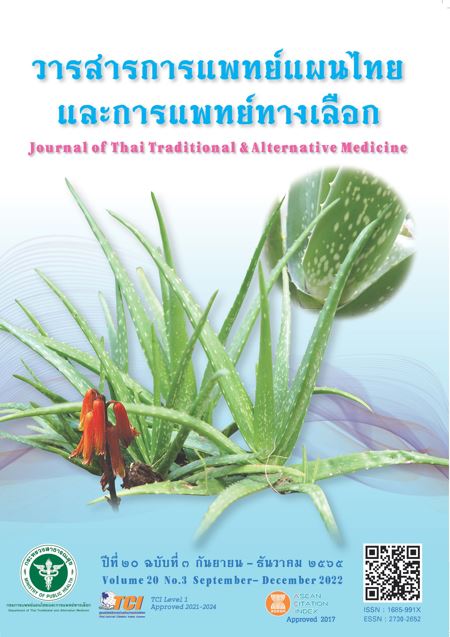Efficacy of Aloe Vera Extract Versus Omeprazole in the Treatment of Symptomatic Gastroesophageal Reflux Disease
Main Article Content
Abstract
Gastroesophageal reflux disease (GERD) is a common chronic condition characterized by heartburn and regurgitation, which affect the quality of life. Its treatment includes lifestyle modification and medication to reduce gastric acid secretion. However, long-term use of proton pump inhibitors in non-excessive gastric acid patients causes an imbalance of the gut flora. This causes inflammation and long-term destruction of the epithelial cells of the esophagus. Aloe vera has antioxidant, anti-inflammatory, antimicrobial, and pain-relieving properties. This research aimed to explore the efficacy of 70 mg Aloe vera extract in capsule form to reduce the frequency and
severity of GERD for 4 weeks compared with omeprazole to determine an appropriate alternative treatment for the disease. In this open-labelled randomized controlled trial research, after participating, participants completed
a record of the symptoms and severity of the disease including heartburn, regurgitation, dysphagia, flatulence, and nausea/vomiting. Then, the patients were followed up at 2 and 4 weeks, and their GERD frequency and severity were compared using Generalized Estimating Equations for repeated measures with multivariable correlation. The results showed that Aloe vera extract significantly reduced the frequency of dysphagia and the severity of heartburn better than omeprazole. The mean frequency of dysphagia in the Aloe vera group decreased by 0.12 time per week, compared to the omeprazole group with a drop by 0.04 time per week (P = 0.042). And, the severity of heartburn in the Aloe vera group dropped by 2.31 points per week, compared with the omeprazole group with a decrease of 1.40 points per week – the decrease levels were significantly different (P = 0.036); however, there were reports of abdominal pain and diarrhea after Aloe vera extract medication. Thus, Aloe vera extract capsules may be used as
an alternative remedy to relieve GERD symptoms.
Article Details

This work is licensed under a Creative Commons Attribution-NonCommercial-NoDerivatives 4.0 International License.
References
El-Serag HB, Sweet S, Winchester CC, Dent J. Update on the epidemiology of gastro-esophageal reflux disease:
a systematic review. Gut. 2014;63(6):871-80.
Paraya Assanasen. GERD: a problem of working people. [Internet]. 2016 [cited 2021 Apr 17]; Available from: https://www.si.mahidol.ac.th/Th/healthdetail. asp?aid=1225. (in Thai)
Patrick L. Gastroesophageal reflux disease (GERD): a review of conventional and alternative treatments. Altern Med Rev. 2011;16(2):116-33.
Wu JCY, Mui LM, Cheung CMY, Chan Y, Sung JJY. Obesity is associated with increased transient lower esophageal sphincter relaxation. Gastroenterology. 2007;132(3):883-9.
Keeratichananont S. Gastro-esophageal-reflux-disease (GERD): symptoms, diagnosis and management. Wongkarnpat. 2017;468:1-8. (in Thai)
Badillo R, Francis D. Diagnosis and treatment of gastroesophageal reflux disease. World J of Gastrointest
Pharmacol Ther. 2014;5(3):105-12.
Sandhu DS, Fass R. Current trends in the management of gastroesophageal reflux disease. Gut Liver. 2018;12(1):7-
Tseng H-J, Cheng C-M, Tsai S-J, Lin W-C, Bai Y-M, Tsai C-F, Su T-P, Li C-T, Chen T-J, Chen M-H. Proton pump inhibitor exposure and acute myocardial infarction risk: a nested cohort study. Cardiovasc Toxicol. 2021;21(6):444-50.
Tai S-Y, Chien C-Y, Wu D-C, Lin K-D, Ho B-L, Chang Y-H, Chang Y-P. Risk of dementia from proton pump inhibitor use in Asian population: a nationwide cohort study in Taiwan. PLoS One. 2017;12(2):e0171006.
Kinoshita Y, Ishimura N, Ishihara S. Advantages and disadvantages of long-term proton pump inhibitor use.
J Neurogastroenterol Motil. 2018;24(2):182-96.
Sánchez M, González-Burgos E, Iglesias I, Gómez-Serranillos MP. Pharmacological update properties of
Aloe vera and its major active constituents. Molecules. 2020;25(6):1324.
Panahi Y, Khedmat H, Valizadegan G, Mohtashami R, Sahebkar A. Efficacy and safety of Aloe vera syrup for
the treatment of gastroesophageal reflux disease: a pilot randomized positive-controlled trial. J Tradit Chin Med.
;35(6):632-6.
Yoshida N. Inflammation and oxidative stress in gastroesophageal reflux disease. J Clin Biochem Nutr. 2007;40(1):13-23.
Kaithwas G, Singh P, Bhatia D. Evaluation of in vitro and in vivo antioxidant potential of polysaccharides
from Aloe vera (Aloe barbadensis Miller) gel. Drug Chem Toxicol. 2014;37(2):135-43.
Sadgrove NJ, Simmonds MSJ. Pharmacodynamics of Aloe vera and acemannan in therapeutic applications
for skin, digestion, and immunomodulation. Phytother Res. 2021;35(12):6572-84.
Li C-Y, Suzuki K, Hung Y-L, Yang M-S, Yu C-P, Lin S-P, Hou Y-C, Fang S-H. Aloe metabolites prevent LPSinduced
sepsis and inflammatory response by inhibiting mitogen-activated protein kinase activation. Am J Chin Med. 2017;45(4):847-61.
Al-Maweri SA, Ashraf S, Lingam AS, Alqutaibi A, Abdulrab S, Alaizari N, Halboub E. Aloe vera in treatment of oral submucous fibrosis: a systematic review and meta-analysis. J Oral Pathol Med. 2019;48(2):99-107.
Ried K, Travica N, Dorairaj R, Sali A. Herbal formula improves upper and lower gastrointestinal symptoms and
gut health in Australian adults with digestive disorders. Nutr Res. 2020;76:37-51.
Bruno G, Zaccari P, Rocco G, Scalese G, Panetta C, Porowska B, Pontone S, Severi C. Proton pump inhibitors
and dysbiosis: current knowledge and aspects to be clarified. World J Gastroenterol. 2019;25(22):2706-19.
Zhang C, Kwong JSW, Yuan R-X, Chen H, Xu C, Wang Y-P, Yang G-L, Yan J-Z, Peng L, Zeng X-T, Weng H,
Luo J, Niu Y-M. Effectiveness and tolerability of different recommended doses of PPIs and H2RAs in GERD:
network meta-analysis and GRADE system. Sci Rep. 2017;7:41021.
Ang D, Sifrim D, Tack J. Mechanisms of heartburn. Nat Clin Pract Gastroenterol Hepatol. 2008;5(7):383-92.
Guo X, Mei N. Aloe vera: a review of toxicity and adverse clinical effects. J Environ Sci Health C Environ Carcinog
Ecotoxicol Rev. 2016;34(2):77-96.
Zhang M, Hou Z-K, Huang Z-B, Chen X-L, Liu F-B. Dietary and lifestyle factors related to gastroesophageal
reflux disease: A systematic review. Ther Clin Risk Manag. 2021;17:305-23.


